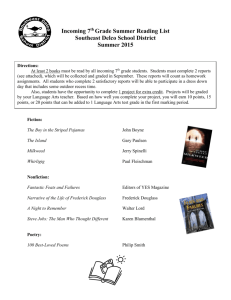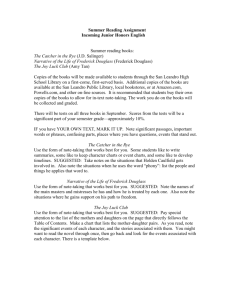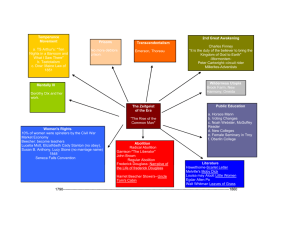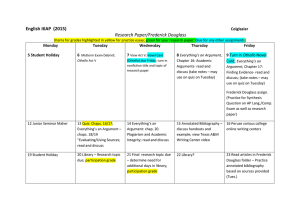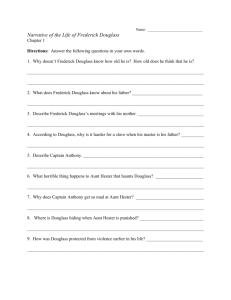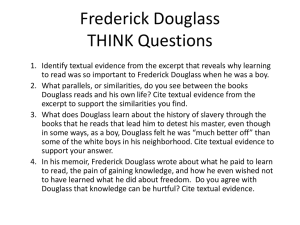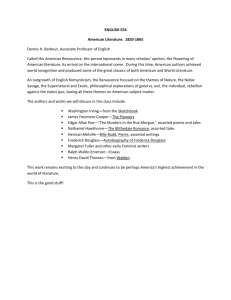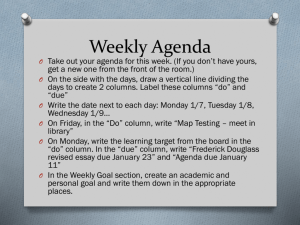English III 2015 2016 AP Language Summer Reading Letter and
advertisement
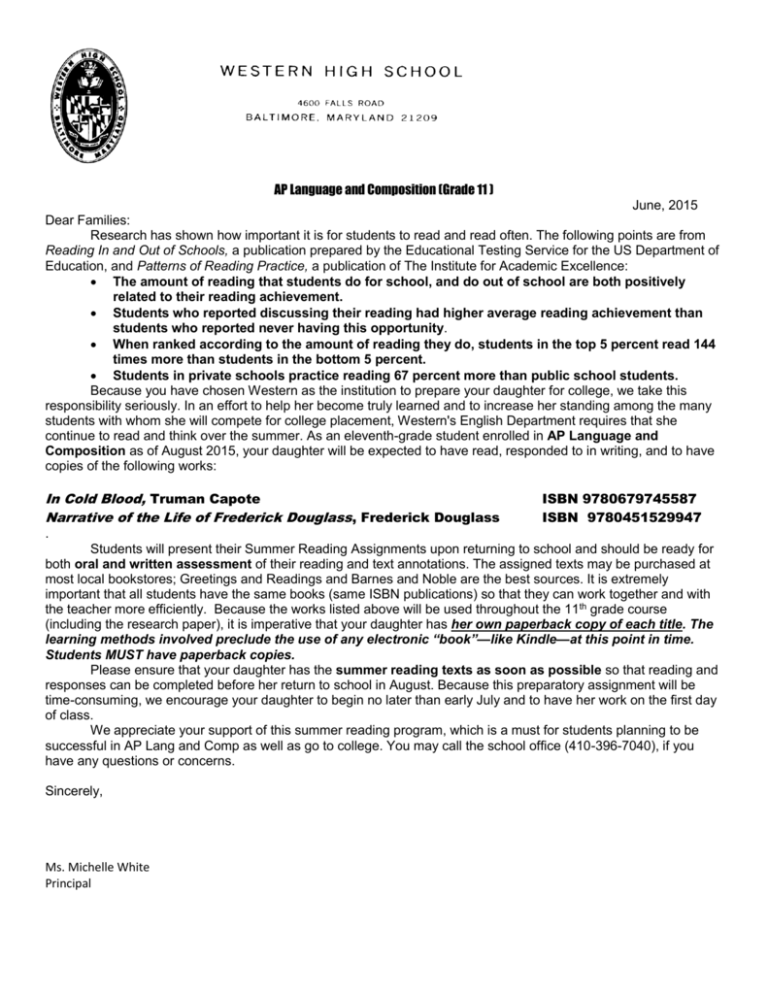
AP Language and Composition (Grade 11 ) June, 2015 Dear Families: Research has shown how important it is for students to read and read often. The following points are from Reading In and Out of Schools, a publication prepared by the Educational Testing Service for the US Department of Education, and Patterns of Reading Practice, a publication of The Institute for Academic Excellence: The amount of reading that students do for school, and do out of school are both positively related to their reading achievement. Students who reported discussing their reading had higher average reading achievement than students who reported never having this opportunity. When ranked according to the amount of reading they do, students in the top 5 percent read 144 times more than students in the bottom 5 percent. Students in private schools practice reading 67 percent more than public school students. Because you have chosen Western as the institution to prepare your daughter for college, we take this responsibility seriously. In an effort to help her become truly learned and to increase her standing among the many students with whom she will compete for college placement, Western's English Department requires that she continue to read and think over the summer. As an eleventh-grade student enrolled in AP Language and Composition as of August 2015, your daughter will be expected to have read, responded to in writing, and to have copies of the following works: In Cold Blood, Truman Capote Narrative of the Life of Frederick Douglass, Frederick Douglass ISBN 9780679745587 ISBN 9780451529947 . Students will present their Summer Reading Assignments upon returning to school and should be ready for both oral and written assessment of their reading and text annotations. The assigned texts may be purchased at most local bookstores; Greetings and Readings and Barnes and Noble are the best sources. It is extremely important that all students have the same books (same ISBN publications) so that they can work together and with the teacher more efficiently. Because the works listed above will be used throughout the 11th grade course (including the research paper), it is imperative that your daughter has her own paperback copy of each title. The learning methods involved preclude the use of any electronic “book”—like Kindle—at this point in time. Students MUST have paperback copies. Please ensure that your daughter has the summer reading texts as soon as possible so that reading and responses can be completed before her return to school in August. Because this preparatory assignment will be time-consuming, we encourage your daughter to begin no later than early July and to have her work on the first day of class. We appreciate your support of this summer reading program, which is a must for students planning to be successful in AP Lang and Comp as well as go to college. You may call the school office (410-396-7040), if you have any questions or concerns. Sincerely, Ms. Michelle White Principal Western Senior High School -- AP Language and Composition Summer Reading Assignment Students should purchase copies of the works listed on the reverse side and below, read them thoroughly, and complete the assignments required. Summer Reading Assignments can be found at www.westernhighschool.org. Go to the homepage, click "Academics," then click "English," and then click on you Summer Reading Assignment. Summer Reading Titles: In Cold Blood, Truman Capote Narrative of the Life of Frederick Douglass, Frederick Douglass ISBN ISBN 9780679745587 9780451529947 Part I. Read, Mark, and Annotate Each Text: In the text of each book, you should use underlining, double underlining, asterisks, stars, circles, brackets, or any other appropriately meaningful symbols (DO NOT color in whole paragraphs) to note important information about literary elements and devices. Also be sure to ask questions, make comments, and record thoughts/observations/connections in the margins. (1) Create a color code/key by using different colored pencils for different characters, or themes, or significant repeating symbols or literary devices. This will be useful which you use your book for in-class discussions, or essay development. Put your key on the inside cover of the book DO NOT USE HIGHLIGHTERS AS THEY WILL BLEED FROM ONE PAGE TO ANOTHER. (2) As you read, observe the characters and the conflicts they undergo as well as the possible theme(s) that they help the author create. Mark significant words and/or phrases that would help you understand and remember information about how characters act, what they say, how they look, what they think, what other characters say about them, and what the author may say about them. Include a color code key inside of the front cover or on the title page. (e.g. Juliet-pink; Romeo-green, etc.) (3) Mark words/phrases that show how each author uses literary elements and devices other than characterization--setting, point of view (not in drama), conflict/plot structure, stylistic elements (imagery, personification, repetition, metaphor, irony, etc.) to create effects and ideas. (4) Be sure to “carry on a conversation” with the text as you read by making marginal notes that clarify your marking. This will help you better understand each work and prepare you for discussion and assessment because you will know why you have noted something. (5) NOTE! There should not be any significantly skipped sections (several consecutive pages) in the book which are not marked and annotated. Students whose response is inadequate will not receive full credit for completion. Work will also be scored through the use of a Text Response Rubric which will be used by all sophomore, junior, and senior instructors. You can find this rubric posted on the Western Website with other Summer Reading information as of 1 July 2015. Part II: Compose an Essay: Compose an extended essay responding to ONE of the following prompts. The essay must be a minimum of five paragraphs in length. It must include a thesis and three clear controls. Controls must be “anchored” in literary elements and/or stylistic techniques. Each body paragraph must include specific support from the work. THE MUST CLEARLY DEMONSTRATE THAT YOU HAVE READ AND THOUGHTFULLY ANALYZED THE WORK. DO NOT MERELY SUMMARIZE THE TEXT!!! The essay are to be typed in MLA format (12 pt. font, Times New Roman, Double Spaced, Heading). ESSAYS ARE TO BE TURNED IN ON THE FIRST DAY OF THE SCHOOL YEAR. ESSAYS WILL LOSE 10 POINTS FOR EVERY DAY COMPOSITIONS ARE TURNED IN LATE!!! Prompt A: Truman Capote’s In Cold Blood is creative non-fiction – it is based on a true story but the account has been recreated and events have been organized by the author. In your essay, analyze the intended effect of dividing the book into its respective parts and the impact of these parts on the story as a whole. DO NOT provide a summary of the text! Prompt B: In the non-fiction account, A Narrative of the Life of Frederick Douglass, Frederick Douglass discusses his desire for freedom and what happens when he gets it. Analyze the concept of freedom as it relates to Douglass’s actions and choices throughout the text. DO NOT provide a summary of the text! NOTE: STUDENTS WILL BE ASSESSED ON THE CONTENT OF SUMMER READING WORKS ON THE FIRST DAY OF THE SCHOOL YEAR. ANNOTATED BOOKS AND ESSAYS ARE TO BE TURNED IN FOR A GRADE ON THE FIRST DAY OF THE SCHOOL YEAR! BALTIMORE CITY PUBLIC SCHOOLS NOTICE OF NON-DISCRIMINATION Baltimore City Public Schools does not discriminate on the basis of race, color, ancestry or national origin, religion, sex, sexual orientation, gender identity, gender expression, marital status, disability, veteran status, genetic information, or age in its programs and activities and provides equal access to the Boy Scouts of America and other designated youth groups. For inquiries regarding the non-discrimination policies, please contact: Michelle White, Principal, Western High School 4600 Falls Road Baltimore, Maryland 21209 Ph: 410-396-7040
